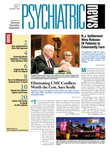Treating pregnant women with clinical depressive symptoms poses a difficult challenge to not only obstetricians and psychiatrists but also to the patients themselves. Specialists in both disciplines have worked together to review the literature and produce a report with practical guidance.
In a collaborative effort, APA and the American College of Obstetricians and Gynecologists (ACOG) convened a work group of psychiatrists and obstetricians/gynecologists led by Kimberly Yonkers, M.D., an associate professor of psychiatry and obstetrics, gynecology, and reproductive sciences at Yale School of Medicine. The work group examined available research and formulated recommendations on how to best manage depression during pregnancy. The report has been published simultaneously in the September Obstetrics and Gynecology and the September/October General Hospital Psychiatry.
Depressive symptoms are present in 14 percent to 23 percent of pregnant women and, if left untreated, can pose serious risks to the health and well-being of both the patient and the fetus she carries, according to the report. Although researchers have examined the risks of antidepressant exposure to birth outcomes to a certain extent, many studies have produced conflicting or inconsistent results. There are even fewer data on the effects of maternal depression on pregnancy and child developmental outcomes. Published studies are often hampered by uncontrolled confounding factors and small sample size.
“There are no clear-cut data [to quantify] the risk of antidepressant treatment independent of the underlying illness,” said Yonkers in an interview with Psychiatric News. Although some antidepressants have been linked to a small but significant increase in adverse risks, studies have not been able to extricate the effect of medications from the effect of depression itself, she pointed out.
The work group devised antidepressant treatment algorithms and guidelines to help physicians make optimal, individualized therapeutic decisions with patients.
A thorough assessment of a patient's current symptoms and medical history is critical for determining the treatment strategy over the course of pregnancy, the group recommended. Physicians are urged to consider psychosocial treatments, especially cognitive-behavioral therapy and interpersonal psychotherapy, for patients with mild-to-moderate depression, especially for women who are planning to become pregnant or who would rather avoid antidepressant medications.
In contrast, patients with a history of severe and/or recurrent depression, psychotic symptoms, bipolar disorder, or a suicide attempt should not be discontinued from drug therapy.
Electroconvulsive therapy is an option for inducing rapid symptom relief for pregnant women who have not responded to antidepressants or other therapy or who are psychotic, suicidal, or severely disabled.
The work group strongly calls for obstetricians and psychiatrists to coordinate their care, especially for patients who require careful monitoring and evaluation as their conditions and symptoms fluctuate. Further,“ respect for the patient's preferences is paramount,” the report states.
The overarching message is “there isn't one simple answer,” according to Yonkers. “A collaborative approach involving the psychiatrist, the obstetrician, and the patient is the best. There is no one scenario that fits every patient.”
Nada Stotland, M.D., M.P.H., immediate past president of APA and an expert in reproductive psychiatry, is a coauthor of this report.
“Depression during pregnancy is a particularly common and vexing clinical problem,” Stotland told Psychiatric News.“ Untreated depression is bad for the pregnancy and a risk for postpartum depression, which is agonizing for the mother and harmful for the baby. The collaboration between APA and ACOG brought both perspectives and bases of knowledge to the work on this paper and will bring this important information to clinicians in both specialties. I hope this project will be a model for many collaborations in the future.”
